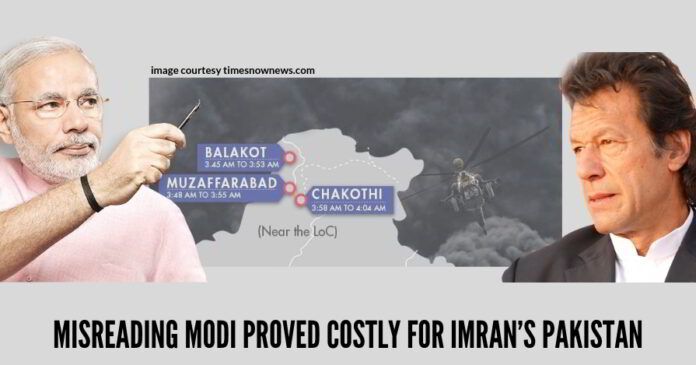
Pakistan wants the escalation contained not because it desires peace but so that it can recoup and allow the terror groups to recover the lost ground.
Pakistan has to contend with many failures at its end as it licks the wounds the Indian Air Force inflicted by the attack on terror camps both in Pakistan-occupied Kashmir and deeper. But the most glaring error Islamabad made was to misread Indian Prime Minister Narendra Modi. Pakistan had been given a fair amount of hint but it had chosen to ignore them, believing that, like previous Indian heads of government, he too was all fury but no fire.
There have been reports that the Indian Air force was prepared to conduct retaliatory strikes in the wake of 26/11 but the political leadership refused to clear the proposal.
Pakistan has itself to blame for this blunder. It had been provided with a fair amount of hint in 2016 when the Indian Army had penetrated into Pakistan-occupied Kashmir and conducted surgical strikes against terror camps. Yet again, after the Pulwama terror attack which claimed the lives of more than 40 soldiers, Modi’s unambiguous statement that elements in Pakistan who orchestrated the attack would pay a heavy price was taken lightly by Pakistan. It appears that even after the humiliation, Pakistan has failed to grasp the changed paradigm in the Indian thought-process, sabre-rattling and invoking its ‘nuclear power’ status. It needs to understand that the Indian ruling establishment has crossed the threshold — a psychological barrier — and would respond even more forcefully in case Pakistan attempts a misadventure.
Both Islamabad and Rawalpindi had assumed that the ‘old normal’ would prevail as the ‘new normal’. The old normal was seen in the aftermath of the 2008 terror strikes by Pakistani terrorists in Mumbai, and on two earlier occasions, in the wake of the attack on Indian Parliament and the Kargil conflict. Despite the grave provocation, Prime Minister Manmohan Singh in the first instance and Prime Minister AB Vajpayee in the second case restrained themselves from ordering a full-scale retaliation. In the Kargil instance, it can be argued that the conflict was localized and, therefore, there was no need to expand the conflict zone. But the attacks on Parliament and in Mumbai had been fit cases to do so.
It was not done for the simple reason that the governments of the day did not want India to be seen as aggressors in the eye of the global community. This was a misplaced apprehension because had India responded with muscle, it could have sold the action as a response to grave provocation. The second reason was that important world leaders were averse to backing India in case it conducted the strikes. The US especially prevailed upon India to demonstrate restraint by swallowing the bitter pill of humiliation. There have been reports that the Indian Air force was prepared to conduct retaliatory strikes in the wake of 26/11 but the political leadership refused to clear the proposal.
India should anticipate some foolish adventures from the Pakistani side and be prepared for an adequate response.
Modi came with a muscular image, and yet he gave peace a chance as much as his predecessors did. His invitation to the Pakistani Prime Minister in 2014 to attend the oath-taking ceremony, his sudden dash to Pakistan to greet his Pakistani counterpart on the latter’s birthday, and a couple of other high profile one-on-one meetings raised expectations of a changed environment. But Islamabad could not shake off the shackles of its military leadership which continued to determine (and undermine) attempts of normalcy between the two countries. For all his projected sincerity, Nawaz Sharif failed to break fresh ground. Imran Khan’s election as Prime Minister made matters worse. Not only was he seen as a puppet in the hands of Pakistan’s powerful military, he proceeded to vitiate the atmosphere for normalcy by resorting to irresponsible statements — such as saying that cordial ties between the two countries would have to wait until Modi was replaced by somebody else as India’s Prime Minister. Meanwhile, he did little — like his predecessors — to rein in terror groups that targeted India.
In may ways, thus, the die had been cast. At least two firsts have now happened. One, for the first time since 1971, New Delhi used air power across the border to target Pakistani assets. And two, again for the first time since 1971, the Indian Air Force has hit beyond Pakistan-occupied Kashmir — in Balakot which is in the Khyber-Pakhtunkhwa region and which housed the Jaish-e-Mohammad’s biggest terror training camp, now in rubbles.
Now that the Rubicon has been crossed and the cost to Pakistan has been raised, what next? To begin with, we now know what is really meant when it is said that ‘Indian forces have been given a free hand’. If Islamabad, and Rawalpindi, grasp the New Reality of a New India, they will seek to course correct. But clearly, they haven’t. Barely twenty fours after the terrorist camps were pounded on their side, Pakistani fighter planes intruded into Indian air space to ‘prove’ Pakistan’s worth. They were chased away, and one of the jets was shot down by Indian forces.
Meanwhile, Pakistan has resorted to another old trickery that it uses when pushed to the wall: Appeal for dialogue. The advantage lies with India and it would be unwise for New Delhi to fall in the trap. Pakistan wants the escalation contained not because it desires peace but so that it can recoup and allow the terror groups to recover the lost ground. India should talk, but only after visible deliverables from the Pakistani side.
Note:
1. The views expressed here are those of the author and do not necessarily represent or reflect the views of PGurus.











In the current situation, if only Modi ji were to tell Pakistan that for every bomb blast by Pak sponsored terrorists inside India, a Nuke would hit Pak – they should start seeing some sense !
It is said old habits die hard.
If we intend to solve 70 years old JK issue,in my humble opinion following should be done:
1).send Abdullah, Nehru-Gandhis(including Ghulam Nabi Azad)- Mufti families to jail, otherwise these families will provoke for the next 70 years and create internal turmoil.
2).Presidential order repealing 370 and 35A
3). few more surgical strikes are needed
4). China and Saudi must stop funding Pakistan
5).Take back POK
6).Recognize Balochistan as a nation by breaking Pakistan into Four pieces
7).reorganize Kashmir assembly seats and make it equal to Jammu
8).send back illegally staying Rohingyas in JK
9).resettle Kashmiri pandits and ex-service men willing to settle in Kashmir and POK
10).declare Jammu as a State, Ladakh as UT, POK merged with Kashmir State
11).holding elections in JK after 2020
India must be free from JK mess by 2022- celebrating 75 years of independence.
We should take this opportunity to up the ante when Pakistan is on a begging bowl to support a sinking economy.Timely help from Saudi Arabia has rescued from a disaster and chaos.Now is the right time to strike Pakistan from all quarters.
India should continue to escalate the issue even if it takes a full scale war and dismemberment of a rogue nation into four parts, Sindh, Baluchistan, Pakhtunkhwanistan and Pakistan to make matters straight, take back POK, abolish article 370 and 35A and let there be peace in the region for once.
Pak’ cannot, & will not change, since, military will prevail over political will, citizens’ welfare.